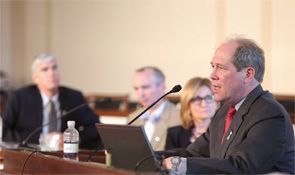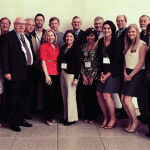
The Rheumatology Research Foundation took its message of continued support for biomedical innovation to Capitol Hill in early September. The Foundation teamed up with the Lupus Foundation of America to brief members of Congress and their staff on the importance of supporting lupus research and the role the National Institutes of Health (NIH) Accelerating Medicines Partnership (AMP) will play in developing drugs to treat autoimmune diseases. Leaders with both organizations say it was a successful meeting with an important mission.
The AMP initiative was launched in February. The goal of this unique research program is to reduce the time and cost needed to develop new drugs to treat specific diseases, including lupus and rheumatoid arthritis (RA). Over the next five years, the AMP initiative will invest $41.6 million toward research into lupus and RA. The research will focus on providing a better understanding of how the diseases work and discovering new targets for drugs that will treat them.
A wide range of stakeholders in biomedical research was represented at the briefing. The speakers included Rep. Jim Moran (VA), co-chair of the Congressional Lupus Caucus, Robert Carter, MD, deputy director of the National Institute of Arthritis and Musculoskeletal and Skin Diseases at the NIH, and Martin Hodge, PhD, senior director, immunoscience, at Pfizer Worldwide Research & Development. David Karp, MD, PhD, Foundation president, gave the final presentation, and Sue Manzi, MD, MPH, a member of the Lupus Foundation of America’s Medical-Scientific Advisory Council, served as moderator.
Dr. Carter explained the goals and structure of the AMP initiative, while Dr. Hodge talked about the role industry plays in the partnership and how it will affect the development of drugs to treat lupus. Afterward, Dr. Karp spoke about the need for funding of lupus research.
“Lupus and similar autoimmune diseases affect 5–8% of all Americans, and they are widespread and have high morbidity and mortality rates.” He explains, “These diseases last a lifetime, can cause severe disability and greatly impact quality of life. Additional funding is needed to advance discovery and science related to these complex diseases, which will ultimately lead to a decreased burden on our patients.”
‘Lupus & similar autoimmune diseases affect 5–8% of all Americans, & they are widespread & have high morbidity & mortality rates.’
—Dr. Karp
Over the past five years, the NIH has funded about $567 million collectively in lupus research. However, in 2013, the annual funding dropped by $16 million. Dr. Karp says private foundations, such as the Rheumatology Research Foundation and the Lupus Foundation of America, have stepped in to try to fill the gap, but their budgets can provide only limited support.

